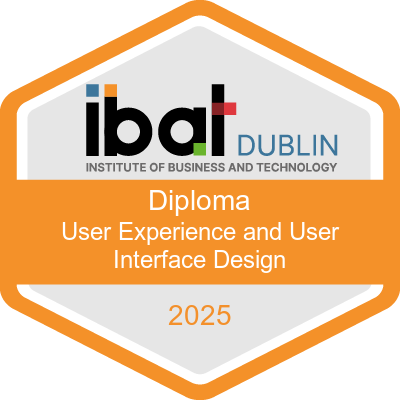- Why UX/UI Design?
- Course Overview
- Career Opportunities
- Entry Requirements
Why UX/UI Design?
Our world is changing, and technology is an essential part of our daily routines. From buying products to paying bills, we carry out many activities online through our various devices.
The UX Design course will:
- Teach you user interface design conceptual and practical tools and techniques to improve user experience.
- Teach you the tools and methods to solve real problems and craft functional, reliable and enjoyable products.
- Allow you to critically evaluate usability goals and principles of interface design.
- Teach you to identify users’ needs for interactive products by applying conceptual and practical tools, including human cognition and behaviour patterns.
- Teach you to plan and develop a design process, from inception to deployment, to improve the usability of interactive products.
Course Overview
The Diploma in User Experience & User Interface (UX/UI) Design is an 11-week programme introducing you to the main concepts, theories, and practical skills in UI/UX design. It will help you develop a critical approach to interactive products from a user-centred perspective.
While still a relatively new profession, UX/UI is a fast-growing sector with many job opportunities in various industries. Due to the centrality of interactive technologies to business success, UX/UI design skills can be applied to virtually any company.
Students on this course in UX design will learn how to identify and match users’ needs with business and usability goals and apply conceptual and practical knowledge to solve real-world problems in interface design. Specific topics addressed in the programme include : design thinking, human-centred design, accessibility/inclusiveness, the psychology of design, the processes and methods of design, interfaces, style and aesthetics, and user evaluation and review.
On successful completion of this course, learners will be able to:
- Critically evaluate usability goals and principles of interface design.
- Identify users’ needs for interactive products by applying conceptual and practical tools, including human cognition and behaviour patterns.
- Plan and develop a design process, from inception to deployment, to improve the usability of interactive products.
- Evaluate user interface design conceptual and practical tools and techniques to improve user experience.
Assessment
The module assessment strategy is aligned to demonstrate the achievement of the module learning outcomes. The assessment strategy combines an individual continuous assessment (30%) and an individual supervised project (70%). They are both designed to evaluate learners’ understanding of the theoretical and conceptual models introduced throughout the module, as well as their application within a real-life scenario.
What is a Professional Diploma?
An IBAT Professional Diploma is a focused, short duration practical course that consolidates, upskills and/or reskills learners in a professional area. They are stand-alone qualifications that do not lead to an award on the National Framework of Qualifications (NFQ).
Career Opportunities
While still a relatively new profession, UX/UI is a fast-growing career with many opportunities in various industries. Due to the centrality of interactive technologies to business success, UX/UI design skills can be applied to virtually any company.
UX/UI design is a fast-growing field and noted by LinkedIn as one of the top 10 most in-demand hard skills that companies need, currently in Ireland the median for a UX/UI designer salary is €50,000 per year, while senior designers can earn €80,000+.
In addition to providing a solid foundation in professional UX/UI design, this diploma course will also equip graduates with career-boosting skills for pursuing opportunities in areas such as the following:
- Web content creation
- Digital, email and social media marketing
- eCommerce and Search Engine Optimisation (SEO)
- Front-end software development
Creative employment in Ireland is growing by 23% year on year, according to GoStudy Consulting and EdTech.
According to Gempool, Ireland’s UX/UI talent pool has been gradually rising, with a 7% increase in the overall number of UX/UI Designers in 2019 compared to the previous year.
Academic Progression Opportunities
Learners who graduated with this Diploma and are interested in furthering their study in the area of web development are eligible to progress onto the more Diploma in Web Design and Advanced Diploma in Front End Development.
Entry Requirements
No prior academic qualification or professional experience is required.
You will require access to a standard laptop or desktop computer and a broadband Internet connection.
Why Study at IBAT Dublin?
We are Ireland’s leading enterprise-focused third level institution with a special focus on how we guide, support, and mentor our students throughout their college experience and into their working lives.
We know that employers need graduates that can hit the ground running, so we’ve tailored our courses to prepare you to do just that. And if you need an extra hand, our Academic team equipped with years of lecturing and industry experience are ready to support you both in your professional and personal development.
Diverse Programmes
Take your pick of our wide range of courses, each designed with your future in mind.
Expert Tutors
Learn from industry professionals at the very top of their game.
Flexible Learning
Life happens. We get it. Study and achieve your goals on your schedule.
Central Location
Study at one of our two campuses placed in the heart of central Dublin.
Small Class Sizes
Get one-to-one, personalised support from our tutors.

Meet Our Students
Hear from our students as they share why they chose IBAT Dublin and the invaluable benefits they’ve gained from their journey with us.
Study options
You can attend lectures Online or On Campus, offering maximum flexibility with your time and how you learn.
Online Study
On Campus Study
Digital Certification
A Digital Certificate will be issued upon successful completion of an in-class exam for each of the two modules, in addition, you will also receive a Digital Badge.
What is a Digital Badge?
A micro-credential is a compact credential that verifies the achievement of a skill or knowledge gained. A Digital Badge is a visual representation of having earned a micro-credential which can be shared on various online platforms to showcase the earner’s achievement.
Why have a Digital Badge?
Your Digital Badge and Certificate can be shared on social media channels such as LinkedIn and Facebook. Digital Badges can also be added to email signatures, displayed on resumes or added to recognised achievement platforms such as Badgr, Credly and OpenBadges. These are a great way to communicate your knowledge and skills, and highlight your commitment to Continuing Professional Development (CPD).









